You are using an out of date browser. It may not display this or other websites correctly.
You should upgrade or use an alternative browser.
You should upgrade or use an alternative browser.
Official Climate Change Thread
- Thread starter 88m3
- Start date
More options
Who Replied?Billions of crabs went missing around Alaska. Scientists now know what happened to them

By Rachel Ramirez, CNN
4 minute read
Updated 3:04 AM EDT, Fri October 20, 2023
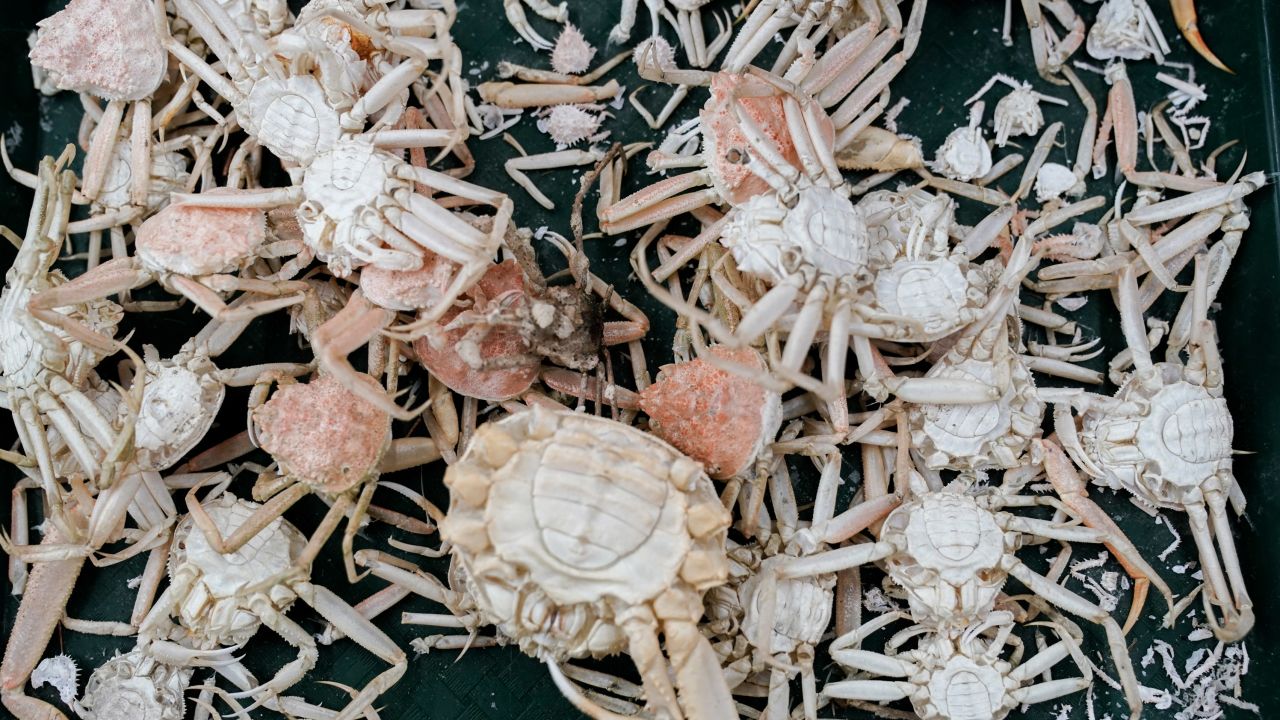
Molts and shells from snow crab sit on a table in June at the Alaska Fisheries Science Center in Kodiak, Alaska.
Joshua A. Bickel/AP
CNN —
Billions of snow crabs have disappeared from the ocean around Alaska in recent years, and scientists now say they know why: Warmer ocean temperatures likely caused them to starve to death.
The finding comes just days after the Alaska Department of Fish and Game announced the snow crab harvest season was canceled for the second year in a row, citing the overwhelming number of crabs missing from the typically frigid, treacherous waters of the Bering Sea.
The study, published Thursday by scientists at the National Oceanic and Atmospheric Administration, found a significant link between recent marine heat waves in the eastern Bering Sea and the sudden disappearance of the snow crabs that began showing up in surveys in 2021.
“When I received the 2021 data from the survey for the first time, my mind was just blown,” said Cody Szuwalski, lead author of the study and fishery biologist at NOAA. “Everybody was just kind of hoping and praying that that was an error in the survey and that next year you would see more crabs.”
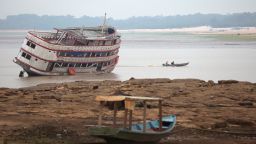
Amazon rivers fall to lowest levels in 121 years amid a severe drought
“And then in 2022, it was more of a resignation that this is going to be a long road,” Szuwalski told CNN.
That year was the first the US snow crab fishery was closed in Alaska. Catchers have attributed to the population decline to overfishing, but “overfished” is a technical definition that triggers conservation measures, experts told CNN — it doesn’t actually explain the collapse.
" data-check-event-based-preview="" data-network-id="" data-details="" style="box-sizing: inherit; -webkit-font-smoothing: antialiased; text-rendering: optimizelegibility; clear: both; margin: 0px auto 16px; width: 910px; max-width: unset;">
Video Ad Feedback
Hear how fishermen are being impacted by the cancellation of snow crab season in Alaska
01:49 - Source: KTUU
“The big take home for me from the paper, and just the whole experience in general, is that historically, fishery scientists had been very worried about overfishing — this has been our white whale, and in a lot of places we really solved that with management,” Szuwalski said. “But climate change is really throwing a wrench into our plans, our models and our management systems.”
For the study, scientists analyzed what could have triggered the disappearance of the snow crabs beginning in 2020 and boiled it down to two categories: the snow crabs either moved or died.
Szuwalski said they looked north of the Bering Sea, west toward Russian waters and even into deeper levels of the oceans, and “ultimately concluded that it was unlikely that the crabs moved, and that the mortality event is probably a big driver.”
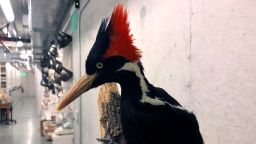
The ivory-billed woodpecker will not be listed as extinct — for now
They found that warmer temperatures and population density were significantly linked to higher mortality rates among mature crabs.
The reason behind the mortality event: hungrier crabs.
Snow crabs are cold-water species and found overwhelmingly in areas where water temperatures are below 2 degrees Celsius, though they can function in waters up to 12 degrees Celsius, according to the study. Warmer ocean water likely wreaked havoc on the crabs’ metabolism and increased their caloric needs.
The amount of energy crabs needed from food in 2018 — the first year of a two-year marine heat wave in the region — may have been as much as quadrupled compared to the previous year, researchers found. But with the heat disrupting much of the Bering Sea’s food web, snow crabs had a hard time foraging for food and weren’t able to keep up with the caloric demand.
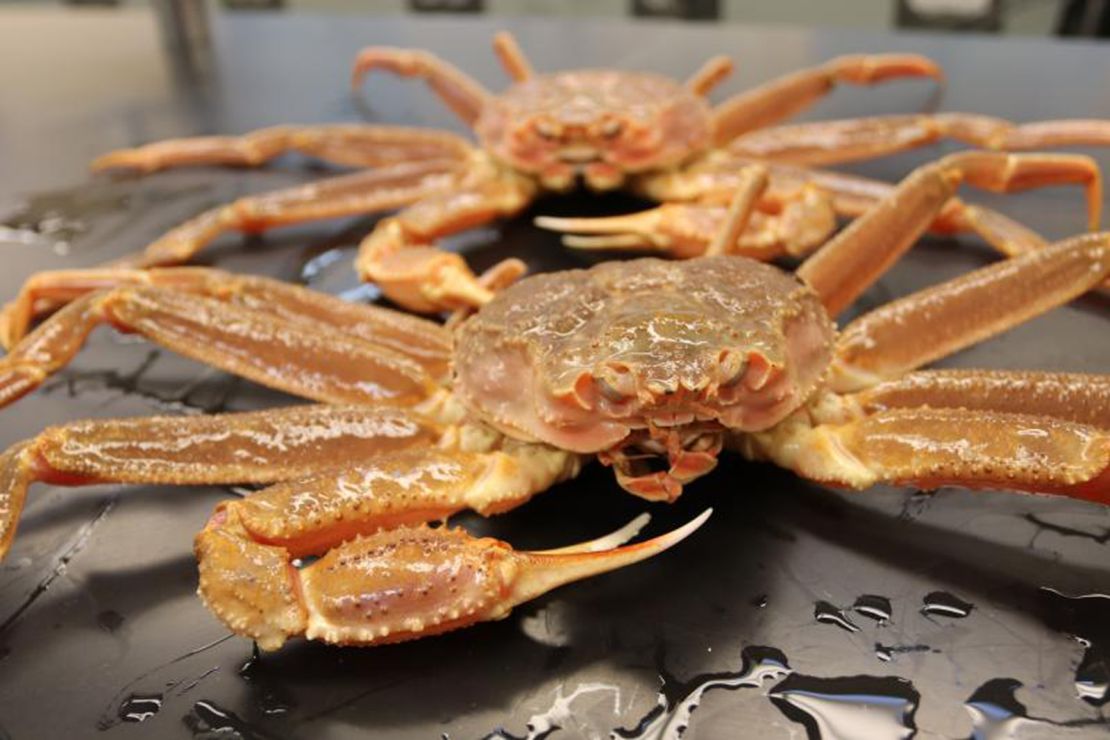
Scientists believe the crabs likely starved to death. Fish like Pacific cod likely swooped into the warmer water to feed on what was left.
NOAA Fisheries
Other species took advantage of this dire situation, said Kerim Aydin, a co-author of the study and fisheries research biologist with NOAA’s Alaska Fisheries Science Center.
Normally, there is a temperature barrier in the ocean that prevents species like Pacific cod from reaching the crabs’ extremely cold habitat. But during the heat wave, the Pacific cod were able to go to these warmer-than-usual waters and ate a portion of what was left of the crab population.
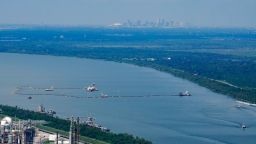
The toxic, corrosive reason saltwater intrusion would be a catastrophe for New Orleans
“This was a huge heat wave effect,” Aydin told CNN. “When the heat wave came through, it just created a huge amount of starvation. Other species may have moved in to take advantage of it, and then when the heat wave passed, things are maybe a bit more back to normal — although the crabs have a long road to getting past that even in normal times.”
Temperatures around the Arctic have warmed four times faster than the rest of the planet, scientists have reported. Climate change has triggered a rapid loss in sea ice in the Arctic region, particularly in Alaska’s Bering Sea, which in turn has amplified global warming.
“2018 and 2019 were an extreme anomaly in sea ice in the Bering Sea, something that we’d never seen before,” Szuwalski said. “There was maybe 4% of the coverage of ice that we’ve historically seen, and to know whether or not that’s going to continue going forward is hard to say.”
What’s happening with Alaska’s crabs is proof the climate crisis is rapidly accelerating and impacting livelihoods, Szuwalski said. He knew this was going to happen at some point, but he “didn’t expect it to happen so soon.”
“This was kind of an unexpected, punctuated change in their populations,” he said. “But I think long term, the expectation is that the snow crab population will move north as the ice recedes and in the eastern Bering Sea, we probably won’t see as much of them anymore.”
god damn not the delicious snow crabs. looks like there will be more pacific cod, but i don't even know that fish. my 3 staple wild fishes are: snapper, grouper and salmon.
Not nearly enough attention is being given to what's happening in the Antarctic right now.
ADevilYouKhow
Rhyme Reason
ADevilYouKhow
Rhyme Reason

Opinion | I Study Climate Change. The Data Is Telling Us Something New.
There is increasing evidence that global warming has accelerated over the past 15 years rather than continued at a gradual, steady pace.

ADevilYouKhow
Rhyme Reason

Hurricane Otis: Now a Tropical Storm, Otis Cut Off Communications with Acapulco
The coastal city took a direct hit from what forecasters described as a “catastrophic” storm that explosively intensified in just a few hours. It could drop 10 more inches of rain across the region.
ADevilYouKhow
Rhyme Reason
ADevilYouKhow
Rhyme Reason

Reporters - Indigenous people and climate change: With Kenya's Turkana people, when drought kills (1/4)
FRANCE 24 brings you the stories of the people who are on the frontlines of climate change. From Kenya to Panama, via Greenland and Australia, our reporters James André and Achraf Abid went to meet the…
ADevilYouKhow
Rhyme Reason

Atlantic Hurricanes Are Getting Stronger, Faster, Study Finds (Published 2023)
The chance that a storm will get much more dangerous in less than a day has more than doubled over the past few decades.
Redwood
Superstar

Atlantic Hurricanes Are Getting Stronger, Faster, Study Finds (Published 2023)
The chance that a storm will get much more dangerous in less than a day has more than doubled over the past few decades.www.nytimes.com

ADevilYouKhow
Rhyme Reason
Yeah, we’ve been experiencing it
Redwood
Superstar
88m3
Fast Money & Foreign Objects

Opinion | Exxon Mobil’s Pioneer Acquisition Is a Direct Threat to Democracy
By doubling down on fossil fuels, Exxon Mobil is choosing to profit through the most harmful way to the rest of us.
Givethanks
Superstar
Earth is cooked
